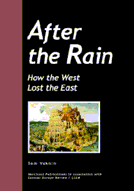|
Read part one of Sam Vaknin's unemployment series of articles first. |
It would be wrong to say that Macedonia has neglected to tackle the social cancer of unemployment.
In 1998, Macedonia decided to give unemployment benefits to the employer—not to the unemployed. While Israel used unemployment benefits to directly subsidize wages by reimbursing the employer—Macedonia has chosen to do so by waiving payroll taxes and subsidizing them in the long term. Unfortunately, the law was cancelled in 1999, with widespread abuses by employers cited as the reason.
Macedonia briefly considered (though rejected as inapplicable) the British experiment with communities of unemployed.
The British experience was to assemble all those unemployed in a specific geographic region into a "community." The community included a wide variety of professions: carpenters and tailors, electricians and farm hands, gardeners and teachers. A computerized centre was set up. Each unemployed person registered with this centre, listing both his professional skills and goods and services that he was interested in, but did not have the money to purchase.
A matching process then ensued: the tailor was looking for a teacher to give his children some private lessons (which he could not afford in his current financial straits). The teacher was looking for a tailor to saw a communion dress for her daughter. So, the computer matched them up: The teacher tutored the tailor's children in return for his services in sewing the dress for her daughter. Both of them were thus employed, recovering their sense of self-worth and dignity. Moreover, both of them were able to afford things which were badly needed by them but which they could afford under other circumstances.
But who will determine how many private lessons provided by the teacher are worth one dress sewed by the tailor?
A special tariff was published. It reflected the conditions which prevailed in the "real" marketplace in which real money changed hands. To ease the "payment" process, special community money was printed in lieu of the unemployment benefits which the government used to dole out to the members of the community. Now, each member of the community received from the Government a monthly allowance in community money (instead of real money) which he or she was able to use only with other, also unemployed members of the community.
This way, the purchasing power of the unemployed was used exclusively with the other unemployed, easing their overall situation. It also eased the government's predicament—because it did not have to print additional money to pay out unemployment benefits.
This was a return to primordial, pre-monetary, barter economy. But it is precisely the kind of economy that prevails in Macedonia. In a way, Macedonian society—tribal and local patriotic as it is—provided a social safety net to the unemployed by spontaneously fostering numerous barter communities.
The true picture
Yet, Macedonia failed spectacularly in tackling its unemployment. The first problem facing decision-makers is that no one in Macedonia knows the real picture. How many are employed and not reported or registered? How many are registered as unemployed but really have a job? How many are part-time workers and how many work full time? How many are officially employed (de jure) but de facto unemployed or severely underemployed? How many are on "indefinite" vacations, on leave without pay, etc?
The Statistics Bureau was never instructed to make the gathering and analysis of data regarding the unemployed (through household surveys and census, if necessary) a top priority.
To generate a truer picture, the state has decided to declare a limited amnesty pertaining violations of worker registration by employers. All employers are to be given 30 days to register all their unregistered and unreported workers without any penalty, retroactive or prospective (amnesty). Afterwards, labour inspectors should embark on sampling raids. Employers caught violating the labour laws should be heavily penalized. In severe cases, closures should be enforced against the workplace.
Currently, all unemployed people must register with the Employment Bureau once a month, whether they are receiving benefits, or not. Non-compliance automatically triggers the loss of the status of "unemployed." If a person does not register without good cause, he has the right to re-register, but his "unemployment tenure" re-commences from month one with the new registration.
The Statistics Bureau implements a households' survey in addition to a claimant count. Labour force surveys are conducted at regular intervals regarding the structure of the workforce, its geographical distribution, the pay structure, employment time probabilities. A Standard National Job Classification is in the works.
The unemployment benefits
Unemployment benefits—if excessive and wrongly applied—are self-perpetuating because they provide a strong disincentive to work.
Unemployment benefits should be means tested. There is no reason to pay unemployment benefits to the children of a multi-millionaire. An unemployed person with assets (especially liquid assets) should not receive benefits, even if they are otherwise eligible. The benefits should scale down in accordance with wealth and income. Yet, Macedonia has rejected this sensible approach. Entrenched interests—mainly inside the civil service, the major locus of illicit wealth accumulation—have hampered any discussion of means-tested social benefits.
Macedonia's unemployment benefits are well-structured to provide an incentive to work. They are limited in time, decrease gradually and withheld from certain segments of the population, such as school dropouts, those who never held a job.






